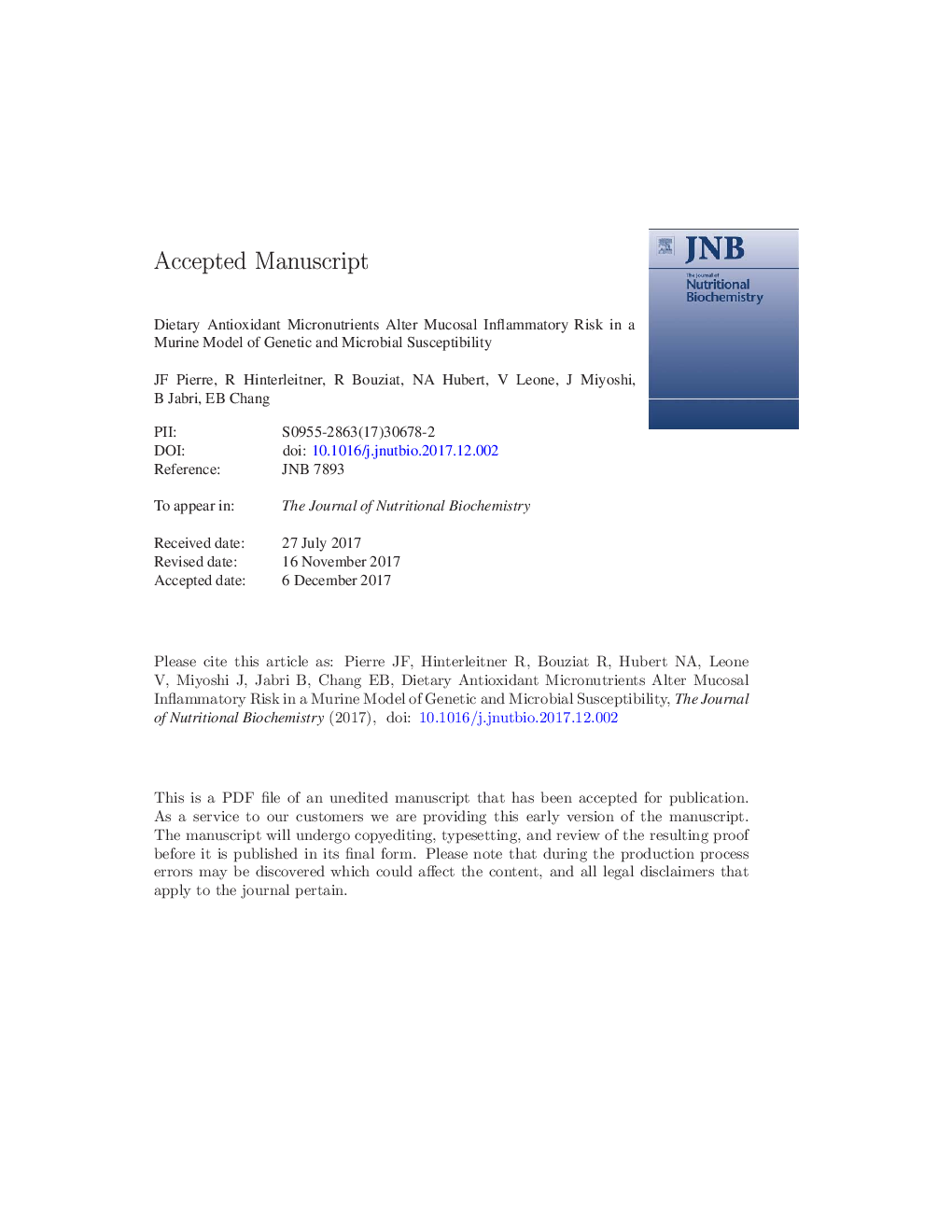| کد مقاله | کد نشریه | سال انتشار | مقاله انگلیسی | نسخه تمام متن |
|---|---|---|---|---|
| 8336413 | 1540614 | 2018 | 28 صفحه PDF | دانلود رایگان |
عنوان انگلیسی مقاله ISI
Dietary antioxidant micronutrients alter mucosal inflammatory risk in a murine model of genetic and microbial susceptibility
ترجمه فارسی عنوان
ریزمغذی های آنتی اکسیدان رژیم غذایی خطر ابتلا به التهابی مخاطی را در یک مدل موش حساسیت ژنتیکی و میکروبی
دانلود مقاله + سفارش ترجمه
دانلود مقاله ISI انگلیسی
رایگان برای ایرانیان
کلمات کلیدی
حلقه های خود پر شدن، پوچیتس، بیماری روده التهابی آنتی اکسیدان ها، اسید رتینوئیک، اسید اسکوربیک، کولیت زخم،
موضوعات مرتبط
علوم زیستی و بیوفناوری
بیوشیمی، ژنتیک و زیست شناسی مولکولی
زیست شیمی
چکیده انگلیسی
Inflammatory bowel diseases (IBD) are caused by the convergence of microbial, environmental, and genetic factors. Diet significantly alters these interactions by affecting both the host and microbiome. Using a mucosal inflammatory model that resembles the human condition of ileal pouchitis, we investigated the effects of Control (CONT) or Antioxidant (AOX) diet, containing pharmacologically relevant levels of 4 micronutrients, on disease risk in wild-type and IL-10â/â animals following surgical self-filling (SF) ileal blind loop placement. Although no differences were found in body weight change or survival, IL-10â/â CONT animals had significantly larger lymphoid organs compared with IL-10â/â AOX or with WT. SF loops from IL-10â/â CONT loop mucosa demonstrated histological inflammation, characterized by goblet cell depletion, increased mucosal myeloperoxidase (MPO), and elevated IFNγ, TNFα, and IL-17α gene expression, which AOX attenuated. AOX elevated luminal IgA in IL-10â/â animals, but not significantly in WT. In IL-10â/â animals, AOX significantly decreased the percentage of CD4 + T-bet and CD4 + RORγ T-cells compared with CONT, with no changes in CD4 + Foxp3+ Treg cells. 16S rRNA gene sequencing demonstrated AOX increased microbial alpha diversity compared with CONT in both genotypes. Notably, colonizing germ-free IL-10â/â hosts with CONT bacterial communities, but not AOX, recapitulated the inflammatory phenotype. Collectively, these findings highlight that common dietary antioxidant micronutrients reshape the gut microbial community to mitigate intestinal inflammatory profiles in genetically susceptible hosts. Insights into the dietary-immune-microbial nexus may improve understanding for recurrent inflammatory episodes in susceptible patient populations and opportunities for practical therapeutics to restore immune and microbial homeostasis.
ناشر
Database: Elsevier - ScienceDirect (ساینس دایرکت)
Journal: The Journal of Nutritional Biochemistry - Volume 54, April 2018, Pages 95-104
Journal: The Journal of Nutritional Biochemistry - Volume 54, April 2018, Pages 95-104
نویسندگان
Joseph F. Pierre, Reinhard Hinterleitner, Romain Bouziat, Nathan A. Hubert, Vanessa Leone, Jun Miyoshi, Bana Jabri, Eugene B. Chang,
